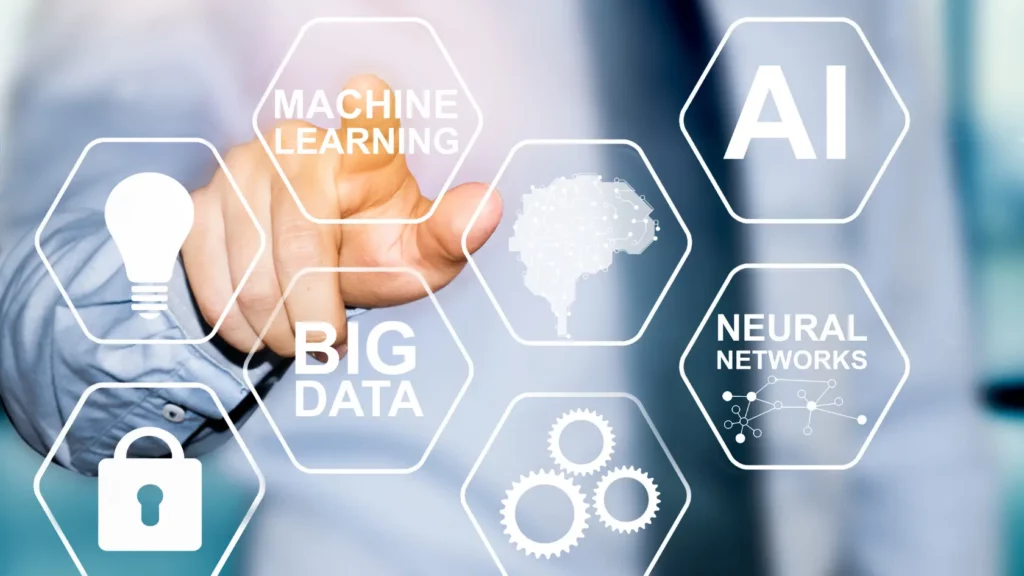
The wave of digital transformation in engineering is turning the tide across multiple sectors, heralding a new era of innovation and efficiency. Digital transformation is no longer just a buzzword; it’s the driving force propelling businesses towards the future. Its impact is profoundly felt across all sectors, including engineering fields such as construction, rail, oil and gas, defence, aerospace, and automotive. But what does digital transformation in engineering entail and how are AI and machine learning facilitating this revolution? Let’s find out.
What Is Digital Transformation in Engineering?
So, what exactly do we mean by ‘digital transformation’? In the context of an engineering company, digital transformation refers to the integration of digital technology into all areas of a business. For instance, a construction company may use 3D modelling software for digital design or drone technology for site surveys, replacing traditional manual methods and thereby increasing efficiency and accuracy.
The Advent of Digital Transformation in Engineering
In the words of Elon Musk, “Any product that needs a manual to work is broken.”
In line with this ethos, digital transformation aims to create intuitive systems that optimise work processes, often in ways we could hardly imagine a few years ago. AI and machine learning have been at the heart of this change, allowing data-driven decision-making that outperforms traditional methods.
Today’s engineering sectors are harnessing these technologies to automate tasks, predict outcomes and even develop new solutions to old problems.
How AI and Machine Learning are Driving Digital Transformation in Engineering
From automated production lines in automotive factories to drones mapping out construction sites, AI’s influence is widespread and growing. Leveraging machine learning, these AI systems can learn and adapt, improving their performance over time. These technologies enable engineering companies to work smarter, not harder, leading to improvements in efficiency, safety, and productivity.
Machine learning, a subset of AI, is like having a tireless staff member who learns quickly without forgetting. These systems can detect patterns, learn from them, and make predictions or decisions based on this knowledge.
For example, in the oil and gas industry, machine learning algorithms can analyse vast amounts of data to predict potential equipment failures before they occur, helping to minimise downtime. This could take predictive maintenance to a whole new level!
Also Read: AI and Robotis: Advancements and Potential Applications
The Four Pillars of Digital Transformation in Engineering
To better understand digital transformation in engineering, it can be helpful to consider its four main areas: Data, Automation, Customer Experience, and Culture.
Data – The Lifeblood of Digital Transformation
In the era of digital transformation, data is king. For engineering companies, it can provide invaluable insights into various aspects of operations. Machine learning algorithms and AI can be used to process and analyse these vast datasets, enabling predictive analysis, improved decision-making, and innovative solutions.
In the context of the aerospace sectors, for instance, data from sensors embedded in machinery or equipment can help predict maintenance needs or identify potential safety issues before they become a problem.
Automation – Boosting Productivity and Efficiency
Digital transformation in engineering is synonymous with automation. The ability to automate repetitive, manual tasks using digital technology can drastically increase productivity and efficiency within engineering companies.
In the automotive industry, for example, AI-driven robotics is widely used on assembly lines to speed up production processes and improve precision. Similarly, in the construction sector, digital tools can automate various aspects of project management, streamlining workflows and enhancing coordination.
Recommended: How Construction Technology is Changing the Industry
Customer Experience – Enhancing Service Delivery
Digital transformation in engineering also extends to how companies interact with their clients. With the rise of digital platforms, clients expect fast, efficient, and transparent service delivery. Digital tools can improve communication, facilitate real-time updates, and even offer predictive insights, all of which can significantly enhance the client experience. In the rail sector, for instance, digital platforms could provide real-time updates on project progress to all stakeholders, reducing miscommunication and increasing transparency.
Culture – Embracing Innovation and Flexibility
Perhaps the most challenging aspect of digital transformation is the need for cultural change within the organisation. To fully reap the benefits of digital transformation, engineering companies must foster a culture that encourages innovation, embraces new technologies, and is adaptable to change. This could mean investing in upskilling staff, encouraging a more collaborative work environment, or adopting more flexible operational structures.
As famously said by Jack Welch, former CEO of General Electric, “When the rate of change on the outside exceeds the rate of change on the inside, the end is near.” To stay relevant, engineering firms must be willing to adapt and evolve in the face of digital transformation.
The Role of AI and Machine Learning in Digital Transformation
AI and machine learning play a critical role in the digital transformation in engineering sectors of all types. AI algorithms can sift through mountains of data to provide actionable insights or predict trends, while machine learning can adapt to changing circumstances and learn from new data without being explicitly programmed.
As famed computer scientist, Alan Turing once said, “We can only see a short distance ahead, but we can see plenty there that needs to be done.” Now, we are diving into that work, leveraging the power of artificial intelligence (AI) and machine learning to transform our industries.
Conclusion
The road to digital transformation in engineering is not without challenges, but the benefits it brings are immense and undeniable. Speaking of challenges – our next article will explore the risk around cybersecurity.
So, as we witness this ongoing revolution, it’s exciting to imagine what AI and machine learning will bring to engineering in the coming years. Get ready to embrace a future that’s smarter, more efficient, and full of opportunities.
As Bill Gates once said, “We always overestimate the change that will occur in the next two years and underestimate the change that will occur in the next ten.”
Whether we like it or not, this change is digital transformation in engineering and those who adapt the fastest, will reap the rewards.


 Mail:
Mail: 




